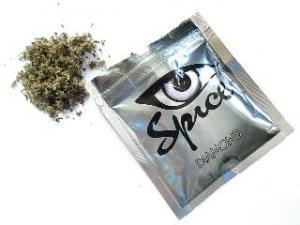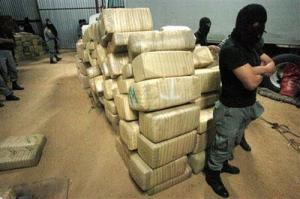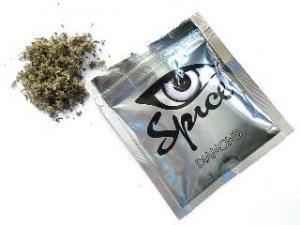Confronted with new synthetic drugs, Congress is poised to do what it always does: ban them. But there is a better way, say advocates.
A trio of academic experts have come up with a drug policy book you're going to want to read, even if only to argue with it. Especially to argue with it.
Florida's drug law has been found unconstitutional because it did not require proof of criminal intent. Tens or hundreds of thousands of cases could be affected.
The Cook County Board president wants police to quit wasting time jailing small-time marijuana offenders, and the police may just take a half-step in that direction.
Massachusetts activists have taken the first formal step toward putting a medical marijuana initiative before the voters next year.
You know things are messed up when the federal police are shooting at the head of the Ciudad Juarez police. Oh, and 216 more people were killed there in the drug wars last month.
Cops cutting corners to make arrests, a cop caught providing protection for a load of cocaine, and a police force fired for its misbehavior make this week's rogues' gallery.
The Bolivian government is laying plans to buy some legally produced coca -- up to a certain point -- if there is not sufficient licit use for it.
Stymied by drug laws that make the government actually prove something is harmful before banning it, New Zealand is instituting an emergency ban on synthetic cannabinoids while it figures out what to do.
Events and quotes of note from this week's drug policy events of years past.
Confronted with the rising popularity of new synthetic drugs, Congress is responding in a reflexive prohibitionist manner. Last month, bills aimed at banning the substances moved forward in Congress, despite the protests of advocates and businessmen that lawmakers are simply repeating the mistakes of drug prohibition.

Congress never met a new drug it didn't want to ban. (image via Wikimedia)
The bills are aimed at two distinct classes of designer drugs -- synthetic
cannabinoids or fake marijuana sold under names such as Spice and K2, and the synthetic
methcathinone derivatives
mephedrone and
MDVP commonly sold as "bath salts" under names such as Ivory Wave that produce a high likened to those of cocaine, methamphetamine, or ecstasy.
A number of states have moved against fake weed or bath salts or both. In action earlier this year, the DEA imposed a temporary emergency ban on fake weed, but it has not moved yet against bath salts. Now, Congress is poised to get in on the action.
H.R. 1254, the Synthetic Drug Control Act of 2011 and its Senate companion bill,
S. 605 would make both fake marijuana and bath salts Schedule I controlled substances, like LSD, heroin, and marijuana. They also attempt to block new designer drugs by banning whole classes of similar chemical compounds. And they seek to expand the period for which the DEA can impose an emergency ban on a new drug, which the agency did earlier this year with synthetic
cannabinoids. That bill was moving in House committees last week.
Two other bills that would do essentially the same thing have also been filed in the Senate. They are
S. 409, introduced by Sen. Charles
Schumer (D-NY) and
S. 839, sponsored by Sen. Amy
Klobuchar (D-MN). These bills, though, are aimed only at bath salts. (An additional House bill,
H.R. 1571, identified by the Library of Congress legislative tracking system as related to S. 409, has not moved out of committee.)
The bath salts drugs have been associated with spectacular bad reactions, including increased blood pressure, increased heart rate, agitation, hallucinations, extreme paranoia and delusions, and some reports of violent behavior. Fake weed has been associated with less dangerous bad reactions, including confusion, nausea and panic attacks.
The American Association of Poison Control Centers
warned in May that it had seen a nine-fold increase in bath salts-related calls over the previous year, and that was with less than half the year gone. Last year, centers reported 302 calls; as of May of this year, they had received more than 2,200 calls.
That would clearly seem to suggest that use of bath salts is on the rise, but what it means beyond that is not so clear. Without a handle on actual use levels, it is difficult to determine how frequent such adverse reactions are, or how they compare to reported adverse events with other drugs.
Still, Mark Ryan, director of the Louisiana Poison Center, said the substances are the worst he has seen in 20 years at the poison center. "These products create a very severe paranoia that we believe could cause users to harm themselves or others," he said.
Oddly enough, for drugs that are touted as being so horrible, evidence from Britain suggests that somebody likes them quite a bit. According to a report last month in the
Guardian, which cited recently released scientific research, "
Mephedrone is more popular among UK
clubbers than ecstasy despite being banned."
"The legal status wasn't considered important," said Fiona
Measham, a criminology lecturer who led the research. "Among the people we spoke to, I was surprised how much they liked it, how much they enjoyed it. They wanted to take more and were prepared to seek it out and buy it on the illegal market."

"Ivory Wave" is one popular brand of mephedrone. (image via Wikimedia)
But Congress isn't paying attention to foreign researchers. In a statement typical of congressional discourse on the issue, in a hearing last week, Rep. Charles Dent (R-PA), the sponsor of
HB 1254, first listed a number of anecdotal scare stories, then proceeded to warn his colleagues that the drugs were not innocent. "These substances are marketed with innocent sounding names," he said, "but these labels are total misnomers designed to facilitate their legal sale. These drugs have no legitimate medicinal or industrial purposes."
"We are in a new era of drugs," said Sen. Diane Feinstein (D-CA), as she prepared to deal with them with the same tired approach Congress has taken with other drugs -- by banning them.
There is a better way, said reform advocates and representative of trade groups.
"Lawmakers are poised to repeat mistakes from the past by creating ineffective laws that will criminalize more people and drive these substances into the illicit market," said Grant Smith, federal policy coordinator with the
Drug Policy Alliance. "History has clearly shown that prohibiting a drug makes it more dangerous, not less. Instead of more failed drug prohibition
, Congress would be much more successful with an approach that restricts how these drugs are marketed, provides comprehensive drug education, and has strict age controls. To best reduce the harms of these drugs, Congress should instead support rigorous scientific study to better understand what is in these products, and establish a robust system of regulation and control of the synthetic drug market."
"This application of the law is irresponsible," said Daniel Francis, executive director of the
Retail Compliance Association, which represents retail outlets that sell (or sold) K2 as he addressed
HB 1264. "It is the most irresponsible thing a lawmaker can do, an act of prohibition. I hope they wear the responsibility of the consequences of these acts on their minds forever. This law will force even less understood compounds into the market."
"This legislation comes at a time when Washington is seeking to reduce federal spending. Yet, enforcing a federal ban on synthetic drugs isn't going to be cheap and we already know from marijuana prohibition that this approach won't work," said Smith. "The irony is that the only reason that people use synthetic marijuana is because the real thing is illegal. But passage of this legislation will only further escalate the war on drugs, send more people to jail, exacerbate health harms, and ignore four decades of comprehensive research and review that confirms the war on drugs approach has failed," he added.
"The bill covers some potential ingredients in herbal incense products, by no means all, and these ingredients are invisible, no one, no police officer, or retailer can tell what is in the product, if it is legal or not, and this law provides no direction whatsoever in how one is to determine this," pointed out Francis.
The Retail Compliance Association, which sent a
letter of concern to Congress about the issue in April, expects that its efforts to block passage of
HB 1264 this year will be in vain. But that doesn't mean it is rolling over and playing dead. Instead, the group said it is forming a coalition to file a legal challenge to the bill "immediately after it passes."
It has taken decades to get past the hysteria and fear-mongering surrounding traditional drugs, and that is a task that is by no means completed. It would be nice if we didn't have to go through the same sort of rigmarole with these new designer drugs, but we do. At least this time around, there are people around from the beginning who and willing to stand and fight.
back to top
Drugs and Drug Policy: What Everyone Needs to Know, by Mark Kleiman, Jonathan Caulkins, and Angela Hawken (2011, Oxford University Press, 234 pp., $16.95 PB)
Mark
Kleiman isn't real popular among the drug reform set. The UCLA professor of public policy is no
legalizer, and even though he's too much of an evidence-minded academic to be a wild-eyed drug warrior, he still seems to have an unbecoming fondness for the coercive power of the state.
Kleiman, who gets top-billing over coauthors Jonathan
Caulkins of Carnegie Mellon and Angela
Hawken at
Pepperdine, also ruffles reformers' feathers with unnecessary snideness and
snark.
But I watched
Kleiman address Students for Sensible Drug Policy conventions a couple of times, and I thought it was a good thing, a very useful jolt to the group-think that can grip any gathering of
congregants committed to a cause. I thought having the students have to hear the arguments of a leading academic thinker on drug policy who, while not "the enemy," was not especially saying what the average
SSDPer wanted to hear, was salubrious for their critical thinking skills. I still think so.
In
Drugs and Drug Policy,
Kleiman and his coauthors continue with the occasional jibes aimed at the drug reform movement, at times reach conclusions at odds with my own, but also serve up a surprisingly chewy work of drug policy
wonkery in delicious bite-size chunks. The innovative format, something like a series of FAQs organized within broader chapters -- "Why Have Drug Laws?" "How Does Drug Law Enforcement Work?" "What Treats Drug Abuse?" "Can Problem Drugs Be Dealt With at the Source?" -- allows us to unpack that all-encompassing monster called "drug policy" one subset at a time, and for that achievement alone, is worthy of praise. That it manages to cover so much ground in a paltry 234 pages is all the more laudable.
Overall,
Drugs and Drug Policy is smart, reasonable, and thoughtful. It wants policies based on evidence and it advocates for some intelligent alternatives to current policies. It recognizes the utility of needle exchanges, safe injection sites, and opiate maintenance, even as it complains that "harm reduction" has been hijacked by
legalizers. It explains that most people who use drugs -- even those diagnosable as suffering from substance abuse disorders -- will quit using drugs themselves without recourse to treatment. And it even allows that drug use can have beneficial effects, even if it doesn't do so until the seventh chapter.
But
Kleiman et. al dismiss decriminalization as unlikely to have a big impact on the social fiscal burden of drug law enforcement because, even though it doesn't appear to have much impact on consumption, drug consumers are not, for the most part, filling our prisons -- drug dealers are. While they do concede that not criminalizing otherwise law-abiding citizens could have "significant benefits," they seem to underplay the negative, life-long impact of a criminal drug record on one's life prospects.
In fact, they seem all too comfortable with maintaining the pernicious role of the criminal justice system in drug policy even as they recognize that enforcing the drug laws is "unavoidably an ugly process," with its reliance on snitches, surveillance, and other "intrusive methods" of enforcement. To give them credit, they want
smarter drug law enforcement -- concentrating police repression on violent drug dealers while turning a blind eye to discreet dealing, triaging coerced drug treatment spots so they are reserved for the people who could most benefit from them, giving up on interdiction and source country eradication as ineffective -- that might actually reduce the social and fiscal costs of both drug abuse and enforcement, and since drug prohibition isn't going away anytime soon, at least wasting less money on drug war tactics that don't work well should be on the table.
And they reject drug legalization as too scary to experiment with, but seem to imagine it as possible only within a corporate-controlled, heavily-advertised, low-priced scenario similar to that which has accreted around the alcohol industry. Yes, it's probably true that selling cocaine like Coors, would lead (at least initially) to a significant increase in use and problem use, but why does that have to be the only model? A government monopoly similar to the state liquor store model, with reasonable taxes and no corporate pressure to advertise could conceivably allow legalization without the increases in consumption that the authors predict, even though they concede they don't know how large they might be.
Still, when you get to what it is
Kleiman et al. would do if they had their
druthers, all but the most purist of legalization advocates will find a lot to like. They create three separate lists of recommendations -- a "consensus list" of reforms they think are politically doable now or in the near future, a "pragmatic list" of reforms that would appeal to dispassionate observers but could raise the hackles of moralists, and a "political bridge too far list" of reforms too radical for mainstream politicians to embrace.
The "consensus list" includes expanding opiate maintenance therapy, encouraging evidence-based treatment, early intervention by the health care system, encouraging people to quit on their own (as opposed to being "powerless"), relying less on interdiction, ending the charade that alternative development is drug control, and concentrating drug enforcement on reducing violence and disorder, as well as smarter, more effective coerced treatment in the legal system. If we saw the drug czar's office produce a National Drug Control Strategy with these recommendations, we would consider that a great victory. It ain't legalization, but its headed in a more intelligent, more humane direction.
The "pragmatic list" includes recommendations to lower the number of drug dealers behind bars, not reject harm reduction even if it's been "hijacked," stop punishing former dealers and addicts, reduce barriers to medical research on illegal substances, and be open-minded about less harmful forms of tobacco use.
The authors don't neglect alcohol and tobacco -- the two most widely-used drugs -- and that is really evident in their "political bridge too far" recommendations. The first three items there are aimed squarely at reducing alcohol consumption and its ill effects. They also argue for the legalization of individual or collective marijuana cultivation, a sort of legalization without the market, increased study of the non-medical benefits of drugs, and increasing cigarette taxes in low tax states.
I think
Drugs and Drug Policy needs to be read by anyone seriously interested in drug policy reform. It hits almost all the bases, and it's well-informed, provocative, and challenging of dogmatic positions. You don't like the authors' conclusions? Refute them. It'll be good for you.
back to top
A federal judge ruled July 27 that Florida's drug law was unconstitutional, leaving thousands of criminal cases up in the air. US District Court Judge Mary Scriven of Orlando threw out the Florida Drug Abuse Prevention and Control law on the grounds that it violates due process because it does not require prosecutors to prove a person knew he or she possessed illegal drugs.

The federal courthouse in Orlando, where a judge threw out Florida's drug law. (image via Wikimedia)
In 2002, Florida legislators amended the state's drug law, eliminating the requirement that prosecutors prove
mens rea, or criminal intent, as part of obtaining a conviction. Florida was the only state in the nation to not require
mens rea as part of a drug conviction.
"Not surprisingly, Florida stands alone in its express elimination of
mens rea as an element of a drug offense,"
Scriven wrote in her
order. "Other states have rejected such a
draconian and unreasonable construction of the law that would criminalize the 'unknowing' possession of a controlled substance."
The ruling came in the case of
Mackle Vincent Shelton, 33, who was convicted in 2005 of drug charges in Osceola County. Shelton, who is currently serving an 18-year prison sentence for cocaine delivery and other charges, appealed his conviction on the grounds that the jury wasn't required to consider intent in order to convict him.
In his instructions to the jury in Shelton's case, the trial judge told jurors that "to prove the crime of delivery of cocaine, the state must prove the following two elements beyond a reasonable doubt: that
Mackle Vincent Shelton delivered a certain substance; and, that the substance was cocaine." The state
did not have to prove that he knew he was carrying or distributing cocaine or any controlled substance at all.
The
National Association of Criminal Defense Lawyers (
NACDL), which filed an
amicus curiae brief in the case, pointed out that without the criminal intent requirement, "a Federal Express delivery person who unknowingly delivers a parcel containing a controlled substance, would be presumed a felon under Florida’s drug law." Joining the
NACDL in filing the brief, which was favorably cited by the court, were the
Florida Association of Criminal Defense Lawyers, the
ACLU of Florida, the
Drug Policy Alliance, the
Calvert Institute for Policy Research, and 38 professors of law.
Florida defense attorneys applauded the ruling, saying the impact could be huge. Several told the
St. Petersburg Times they intended to file motions seeking dismissal of pending drug cases, citing the judge's order.
"It has one of the largest potential effects on criminal law in the past decade," said St. Petersburg lawyer Jeff Brown. "We're talking hundreds of thousands of drug cases."
"In declaring the statute unconstitutional on its face, it appears that all drug prosecutions in the state are at risk," said Tampa defense lawyer Eddie Suarez.
That's tough, said Tampa attorney James
Felman, who represented Shelton. Legislators should not have written an unconstitutional law removing
mens rea, he said. "It takes the presumption of innocence and throws it in the garbage can,"
Felman said. "I think the legislature must immediately fix the statute," he said. "This is not a close call. No state has ever done this before. Legally, it's beyond the pale."
"This is a victory for the most fundamental notions of fairness and justice in our system -- the idea that no one should suffer a conviction unless the state proves criminal intent beyond a reasonable doubt," said
NACDL executive director Norman
Reimer. "As I previously said about this case, the country has been drifting away from the moral anchor of a clearly defined
mens rea requirement in its criminal laws. Laws like these would run it aground."
back to top
Last year, police in Chicago arrested more than 23,000 people for simple marijuana possession, 78% of them black. But those charges are routinely dropped by judges, and the head of the Cook County Board, who is facing a serious budget gap, wants the police to knock it off.

Toni
Facing a $315 million shortfall, Board President Toni
Preckwinkle announced a 5% spending cut and threatened layoffs if necessary.
Preckwinkle last week discussed the idea of merely ticketing pot smokers with Chicago Police Superintendent Garry McCarthy, and while no decision has yet been taken, the notion is percolating through the police bureaucracy.
"It's pretty well known within the criminal justice system that the judges will dismiss those charges involving very modest amounts of illicit drugs,"
Preckwinkle told the
Chicago Sun-Times. "I suggested to McCarthy that although the law is pretty clear that such possession is a violation of the law, that since the judges routinely and almost universally dismiss such low-level drug charges that the police might stop arresting people for this since it clogs up our jail with these people and their cases will be dismissed out anyway."
This is hardly a unique foray into drug policy reform for
Preckwinkle. She campaigned on a platform of less incarceration and more treatment, and just weeks ago, during an event marking the 40
th anniversary of Nixon's declaration of a war on drugs,
she denounced the drug war as failure.
A Chicago police spokeswoman, Maureen
Biggane, told the Sun-Times McCarthy was considering
Preckwinkle's suggestion. "At this time, the Chicago Police Department is reviewing the possibility of enforcement action other than physical arrest for certain cannabis offenses," she said.
By last Saturday, McCarthy was telling the
Chicago Tribune he was looking into issuing citations for people arrested for small-time pot possession instead of taking them to jail and booking them, but he was eager to point out that they would still be arrested.
"We will continue to make arrests for illegal behavior, whether it's public urination or whether it's carrying a firearm. It's really that simple," McCarthy said. "We're looking at different arrest processing, not not making the arrests."
It's not a done deal yet, McCarthy said. "It's not cooked yet," he said, but added, "I think that people are going to see some changes down the road."
He may face some opposition from within the ranks. According to the
Chicago Reader, some high-ranking police officials don't want to give up the ability to use pot arrests to get "gang bangers" off the streets for a few hours.
Whether the cops' ability to make mass busts of "gang bangers" whose most serious offense is possessing marijuana will win out over the Second City's need to save money in a time of austerity remains to be seen, but the battle lines are being drawn right now.
back to top
A medical marijuana initiative could be headed for the November 2012 ballot in Massachusetts. An advocacy group called the Massachusetts Patient Advocacy Alliance announced Tuesday that it had filed an initiative petition that would allow seriously ill patients to register with the state and be protected from arrest for using marijuana as a medicine. [Update: The official initiative campaign is now online as The Committee for Compassionate Medicine (CCM). Mass. Patients will continue as an advocacy group after Election Day.]

People with cancer, AIDS, multiple sclerosis, and other debilitating conditions could join a patient registry upon receiving a written recommendation from a physician. They would obtain their medicine from state-regulated nonprofit treatment centers. The state Department of Health would oversee the program.
The group handed in the 10 signatures needed to begin the petition process Tuesday, one day ahead of the August 3 deadline to make the 2012 ballot.
There were hints this was coming. Two weeks ago, Massachusetts ACLU field director Whitney Taylor told the
Boston Herald advocates might file an initiative at least in part to pressure the state legislature, which has a medical marijuana bill,
House Bill 625, before it.
"Our goal is the legislature, but there is a possibility they won't act before May of 2012," said Taylor, who helped lead the successful 2008 ballot drive to decriminalize possession of up to one ounce of marijuana. "What's the hurt in moving forward and having all avenues available to us?" Taylor asked. “Regardless of what happens, we now have options."
If it comes to it, both polling and previous election data suggest a medical marijuana initiative can win in Massachusetts. In last November's election, voters in nine districts were asked if they wanted their representatives to vote for medical marijuana, and they said yes in all nine.
Similarly, a
Suffolk University poll found that a whopping 81% (and even 70% of Republicans) said they approved of allowing "seriously ill patients to use, grow, and purchase marijuana for medical purposes if they have the approval of their physicians." And Massachusetts voters passed pot decriminalization in 2008 with 65% of the vote.
Whether or not this initial filing marks the beginning of a serious initiative campaign or not, advocates have just put Bay State lawmakers on notice that if they can't get the job done at the statehouse, the voters just might do it for them at the polls next year.
back to top
by Bernd Debusmann Jr.
Mexican drug trafficking organizations make billions each year smuggling drugs into the United States, profiting enormously from the prohibitionist drug policies of the US government. Since Mexican president Felipe Calderon took office in December 2006 and called the armed forces into the fight against the so-called cartels, prohibition-related violence has killed around 40,000 people, including more than 15,000 last year. The increasing militarization of the drug war and the arrest or killing of dozens of high-profile drug traffickers have failed to stem the flow of drugs -- or the violence -- whatsoever. The Merida initiative, which provides $1.4 billion over three years for the US to assist the Mexican government with training, equipment and intelligence, has so far failed to make a difference. Here are a few of the latest developments in Mexico's drug war:

All the drug busts in Mexico don't seem to make a difference. (image via Wikimedia)
In Veracruz,
a local newspaper published an editorial strongly denying that a recently slain journalist had ties to drug trafficking organizations. Last week the state attorney general said that journalist Yolanda
Ordaz De La Cruz -- who was found decapitated and tortured -- may have been killed by one gang because of her ties to another. The newspaper,
Notiver, has called on state attorney general
Reynaldo Escobar to publicly apologize and resign.
In
Ciudad Juarez,
Interior Minister Francisco Blake said that federal forces would not be withdrawn from Juarez, despite a statement Tuesday by Mayor Hector
Murguia that federal police would be withdrawn in the area in September. The relationship between local security forces and the federal police is notoriously bad. Just last week, federal police shot at the convoy of municipal police chief Julian
Leyzaola.
Friday, July 29
In the city of Chihuahua,
authorities captured a high-ranking figure in La Linea, the armed wing of the Juarez Cartel. Jose Antonio Acosta Hernandez, "El Diego," is alleged to have participated in some 1,500 murders in the
Ciudad Juarez area. Among the crimes he's accused of masterminding is the murder last year of a US consulate employee and the January 2010 massacre of 15 teenagers at a party.
Saturday, July 30
In Nuevo Laredo,
about 80 local leaders including the mayor demanded that the local police force be reinstated. The Nuevo Laredo municipal police was disbanded in June and replaced with military personnel pending the vetting and testing of local police. Crime has since continued to rise. 21 other municipalities in
Tamaulipas also had their security duties taken over by the Mexican military.
Sunday, July 31
In
Ciudad Juarez,
two people were murdered. According to researcher Molly Molloy, this brings July's total to 216, including 13 women and 8 minors.
In
Michoacán,
police arrested the head of the Knights Templar Organization for the city of
Apatzingan.
Nery Salgado Harrison, 24, has been in charge of the
Apatzingan area since 2009 and is thought to be heavily involved in the production and local distribution of meth. The Knights Templar is an off-shoot of La
Familia, which splintered into quarreling factions after the death of boss
Nazario "El
Chayo" Moreno in December 2010.
Monday, August 1
In Acapulco,
federal police captured a high-ranking leader of the Independent Cartel of Acapulco. Moises Montero Alvarez, 42, "El
Koreano," was captured along with one other suspect. Alvarez is thought to be connected to the September kidnapping and murder of 20 tourists from
Michoacán, after apparently being mistaken for members of La
Familia.
In Nuevo Leon,
a police supervisor and his son were gunned down in front of a school in the town of San Nicolas de
las Garza.
Tuesday, August 2
In
Ciudad Juarez, authorities
announced the arrest of a prison director and four guards in connection with last week's deadly clashes which killed 17 inmates in
Ciudad Juarez's municipal jail facility. The director,
Lucio Cuevas, is accused of granting favors to inmates. Video of the shooting shows guards letting in gunmen to open fire on inmates.
In
Coahuila, authorities
captured Valdemar Quintanilla Soriano, allegedly the number two financial operator of the
Zetas Organization.
Quintanilla is also thought to have connections to the top tier of
Zetas leadership, such as
Heriberto Lazcano. Another man was also taken into custody.
In
Reynosa,
five gunmen were killed in a fire fight with the army. The city used Twitter and other social networking sites to warn residents of the fighting, which took place at around noon in the Las Fuentes area of the city.
Reynosa is just across the border from McAllen, Texas.
Total Body Count for 2007: (
approx): 4,300
Total Body Count for 2008: (
approx.): 5,400
Total Body Count for 2009: (
approx.) 9,600
Total Body Count for 2010: (official) 15,273
Total Body Count for 2011: (
approx.): 6,600
back to top
Cops cutting corners to make arrests, a cop caught providing protection for a load of cocaine, and a police force fired for its misbehavior make this week's rogues' gallery. Let's get to it:

pile-of-cash_28.jpg
In Houston,
a Houston police sergeant was arrested July 27 on charges he took a bribe to provide protection for a vehicle carrying several kilograms of cocaine.
Sgt. Leslie Atkins, 46, faces federal charges of aiding and abetting the possession with the intent to distribute more than five kilograms of cocaine and with accepting a $2,000 bribe to provide protection for a vehicle transporting seven kilograms of cocaine. He was arrested after a June 22 indictment was unsealed. The 19-year veteran has been suspended without pay. He faces a mandatory minimum 10-year sentence on the cocaine charge and could get life, and he faces up to 20 years for the bribery count. He is out on $50,000 bail.
In Oak Hill, Florida,
the city council voted Monday to dissolve the police force over a number of issues, including the case of marijuana plants found on the property of 86-year-old Mayor Mary Lee Cook. Cook said publicly she believes the plants were placed there by someone within the department. Police Chief Diane Young and her six sworn officers were asked to turn in their guns and badges, and Volusia County is temporarily taking up some of the law enforcement slack until the city enters into a formal contract for services with the county.
In Tulsa, Oklahoma,
a Tulsa man has sued the city and a Tulsa police officer alleging that he falsified a search warrant that led to his conviction and life sentence in prison.
DeMarco Williams, 36, filed the lawsuit July 28 in federal court in Tulsa and becomes the fifth person to sue the city and current or former police officers accused of falsifying search warrants and other corrupt practices in a festering scandal that keeps on giving. Williams accuses indicted Officer John Henderson of falsifying the search warrant and thus depriving him of his civil rights. He also accuses the city of Tulsa of negligence for failing to keep its cops in line. Henderson and fellow Officer Bill
Yelton were indicted a year ago on a slew of criminal counts and went on trial Monday. Henderson is charged with 58 counts: 22 related to perjury, 20 related to civil rights violations, 12 related to drugs, two witness tampering counts, one firearms count and one attempted bribery count. Some duplicate charges are expected to be reduced during the trial.
Yelton is charged with eight counts: four related to civil rights violations, two related to witness tampering, one related to suborning perjury and one count of attempted retaliation against a witness, which was added in September 2010.
Yelton is not involved in Williams' case. Williams spent six years in jail and prison after being charged and convicted. He was released last year as the Tulsa corruption scandal broke wide open.
In New Orleans,
a New Orleans police officer resigned last Friday as he was being investigated for allegedly lying about a January drug arrest in the Algiers section of the city. Officer Samuel
Birks, a four-year
NOPD veteran, was charged in state court late last month with filing false public records and malfeasance in office.
Birks and his patrol partner, Joshua Hunt, are accused of falsely arresting Alvin Bean, planting a rock of cocaine on him, and lying about the incident. Hunt resigned in June. The charges against Bean were dropped after his defense attorney was able to convince prosecutors that the officers' stories didn't add up. The district attorney's office then dropped the charges against Bean and filed them against
Birks and Hunt. They have both pleaded not guilty.
back to top
The Bolivian government will buy up legally produced "excess" coca to prevent it from leaking into the cocaine trade, Vice Minister of Social Defense Felipe Caceres said last week. The government will use funds from the treasury to make the purchases, Caceres said in remarks reported by the Bolivian newspaper La Razon.

Cultivating coca in the Chapare. (photo by the author)
The announced plan is part of a broader strategy to combat cocaine trafficking. It seeks to reduce coca cultivation from the estimated current 30,900 hectares (only 12,000 of which are legal under existing law) to 20,000 hectares.
A government study of licit coca consumption, which would provide the basis for estimating the size of the licit coca crop, is set for release in September, but
Caceres said the study will estimate the area of licit cultivation at about 16,000 hectares.
For
political reasons -- to keep President
Evo Morales' power base among
Chapare coca growers happy -- the government will allow the excess production up to 20,000 hectares and just buy it up.
"We will buy all that coca so that it is not diverted to the drug trade, to become raw material for drugs, with resources from the general treasury of the nation,"
Caceres said. Cultivation above 20,000 hectares would be manually eradicated, he added.
Bolivia is the world's third largest coca producer -- behind Peru and Colombia -- and some significant portion of that crop is destined to become cocaine smoked in the
favelas of Brazil or snorted in the drawing rooms of Europe. While actively combating the cocaine traffic, the Morales government is determined to support traditional coca consumption and cultivation as part of Bolivia's national heritage.
Earlier this year, Bolivia withdrew -- at least temporarily -- from the United Nations 1961 Single Convention on Narcotic Drugs because of its inclusion of the plant in its list of proscribed substances. Coca is not a drug, it's a plant, Bolivia maintains. The government indicated when announcing its withdrawal from the treaty that it would rejoin in a year, signing on to all the treaty provisions except the proscription on coca.
back to top
In a shift from an April decision to regulate rather than prohibit synthetic cannabinoids, the government of New Zealand's ruling National Party has moved instead to ban them by the end of this week. It is rushing to amend the Misuse of Drugs Amendments Bill to criminalize some 43 fake weed products currently on store shelves.

Synthetic cannabinoids like Spice will be banned in Kiwiland this week. (image via Wikimedia)
The move will create an emergency 12-month ban while the government crafts a detailed response to the
Law Commission's May report on psychoactive substances, which noted that under current New Zealand laws, "a psychoactive substance can be manufactured, imported, and sold without restriction until it is proven harmful and is either regulated or prohibited." The commission called for that burden of proof to be reversed, so that the industry would be required to prove its products are safe.
"We are going to create temporary class drug orders that will allow me to place a 12-month ban on these currently unregulated psychoactive substances and any new ones that come along," Associate Health Minister Peter Dunne announced. "The bottom line is that these products are generally untested and we do not know the long-term effects of their use and we are not about to just let it all happen and pick up damaged young people at the end."
The cabinet would be "looking carefully at crafting permanent legislation in the foreseeable future," said Prime Minister John Key. "We are not going to stand by while these substances are constantly being created and being made available for sale," he added.
Synthetic
cannabinoids, or "
cannibimimetics," in the Law Commission's parlance, are synthetic compounds that mimic the action of THC, producing highs similar to that of natural marijuana. The compounds are sprayed on herbal material and sold in corner stores under names like Spice and K2 in the US, although
Kronic appears to be a favorite name in Australia and New Zealand.
Under the emergency action, fake marijuana will be carry the same penalties as Class
C1 drugs such as marijuana, but mere possession of it will not be a criminal offense.
"We are sending a very strong message that we don't think there is any case for these drugs and we believe they should be taken off the marketplace and we are sending a message to young people that we don't want them taking them," Key said. "It's unacceptable to the government that a product that causes potentially lethal risks is available freely to our young people. If someone's in possession of the products for their own personal use, they could continue to legally use it."
The opposition Labor Party is also supporting the temporary ban. "The government needed to act, you can't have product out there with potentially damaging effects. You should ban the product until they can prove it's safe," party leader Phil Goff told
TVNZ's Breakfast Show Monday morning.
But importer Matt Bowden, who seeks regulation of fake marijuana, warned that prohibition would lead to more potent drugs being developed and would create a black market and empower organized crime.
"Prohibition is counterproductive. It's a failed policy which does nothing for consumers," he said. "A black market happens when you make something illegal and there is a high consumer demand. Right now they are available for a couple of weeks, consumers will be stockpiling them.''
Another interested party, Chris
Fowlie of the
Hempstore, which sells the products, told
TV ONE that despite sensational reports in the media, there are no actual scientific, peer-reviewed studies that back up the sometimes lurid accusations of harm.
"Well, they aren't making it up, but they aren't peer reviewed, so for all we know they could be talking about the same person complaining many times, it could be one particular brand causing all the problems, we don't know, so until we have those studies, it's guess work," he said. "The law does say that the classification of drugs does have to be based on evidence, that's built into the misuse of drugs act and Peter Dunne is ignoring that."
Fowlie predicted that the ban will create new problems. "Firstly you will see retailers dumping stock, we for one will be having a big sale to get rid of everything we've got, and you will see new products come out immediately after the ban."
back to top
August 8, 1988: The domestic marijuana seizure record is set (still in effect today) -- 389,113 pounds in Miami, Florida.
August 6, 1990: Robert C. Bonner is sworn in as administrator of the Drug Enforcement Administration (DEA). Bonner had been a federal judge in Los Angeles. Before he became a judge, Bonner served as a US attorney from 1984 to 1989.
August 9, 1990: Two hundred National Guardsmen and Bureau of Land Management rangers conduct a marijuana raid dubbed Operation Green Sweep on a federal conservation area in California known as King Ridge. Local residents file a $100 million lawsuit, claiming that Federal agents illegally invaded their property, wrongfully arrested them, and harassed them with their low-flying helicopters and loaded guns.
August 4, 1996: In the midst of an election season that included California's medical marijuana initiative, Prop. 215, state narcotics agents, at the direction of California Attorney General Dan
Lungren, raid the Cannabis Buyers' Club of San Francisco.
August 7, 1997: The New England Journal of Medicine opines, "Virtually no one thinks it is reasonable to initiate criminal prosecution of patients with cancer or AIDS who use marijuana on the advice of their physicians to help them through conventional medical treatment for their disease."
August 8, 1999: A CNN story entitled "Teen critics pan national anti-drug ads" reports that high school students are remaining skeptical that the government's anti-drug television ads are much of a deterrent as they believe the constant warnings about the dangers of drug use have dulled the message.
August 7, 2000: The Houston Chronicle runs a front page story about the corruption of paid informants in drug cases.
August 8, 2001: During his third term in Congress,
Asa Hutchinson is appointed by President Bush as Director of the Drug Enforcement Administration (DEA).
August 5, 2004: In a Seattle
Post-Intelligencer op-ed entitled "War on Drugs Escalates to War on Families," Walter
Cronkite calls the war on drugs "disastrous" and a "failure," and provides a plethora of reasons why it should end immediately.
August 6, 2004: The Ninth Circuit orders the release, pending appeal, of Bryan
Epis, who had been convicted of conspiracy to grow 1,000 marijuana plants in a federal trial in which the jury was not allowed to hear that he was a medical marijuana activist.
August 3, 2010: President Obama signs the Fair Sentencing Act of 2010, lowering sentences for crack cocaine offenders.
back to top








